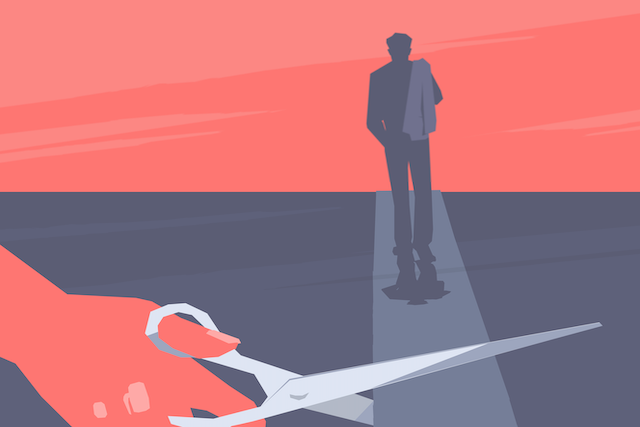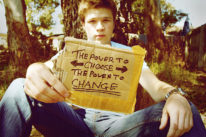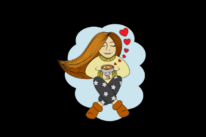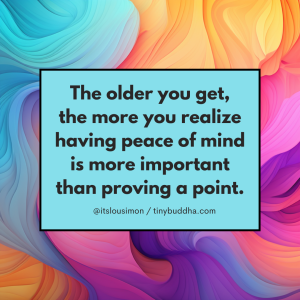
EDITOR’S NOTE: You can find a number of helpful coronavirus resources and all related Tiny Buddha articles here.
“Distance sometimes lets you know who is worth keeping, and who is worth letting go.”
~Lana Del Rey
As COVID-19 started to change my life I found myself thinking about my family. My parents who I haven’t really spoken to much since 2007, and my sister. I wondered how they were doing and what they must have been feeling at that moment.
Then I stopped myself and reminded myself why I had cut connections with them in the first place. I remembered the verbal abuse, the neglect, their lack of respect for my boundaries, and their lack of remorse. I reminded myself of just how hard I had tried to be what they had wanted and how it was never enough.
If someone from your past was not the kind, caring person you needed them to be then, there’s a good chance they won’t be able to be that for you in the present or future.
It’s only natural to want to reach out during times of stress and hardship. It’s only natural to wonder how people you have cut ties with are doing, if they are safe, and to care about their well-being. But I have learned to think before acting on emotion so I don’t end up getting hurt all over again.
In times like this, when we are feeling scared or lonely, we need to reflect on what is best for ourselves. Reconnecting with someone out of fear or guilt might only cause more pain.
If someone you have cut out of your life has contacted you trying to guilt you into responding, or someone else has contacted you on their behalf, remember that you don’t have to respond or engage, and you don’t have to give any explanations.
You don’t need to answer their phone calls or open their letters, texts, or emails. All you have to do is what is best for you. If you don’t know what is best for you, then don’t act now, take some time to think.
If they say they’ve changed, look at the evidence so you don’t get sucked back into toxic patterns—especially now, when life is stressful enough.
This doesn’t mean that we don’t care, this doesn’t mean that we should stop ourselves from thinking about them. I have learned that caring can take many forms. Sometimes for our own well-being we need to care from afar. In our hearts, we can wish them well and hope that they will be okay from a distance.
I know that this isn’t easy, but we need to protect our mental health. There is no shame in doing what you feel is best for you because you are responsible for your own mental health and happiness. You should never feel guilty for that, even if that means you might disappoint someone.
To be fair, your situation might be different from mine. I know from my own lived experience that I can never reconnect with my family again. My interactions with them have taught me that they have not changed, and they will never see or respect me. For my own mental health, I’ve decided I will never open that door again, but this might not be the same for you.
Perhaps your former loved one has changed. Times like this cause people to reflect on their mistakes and what really matters in life. And there’s something to be said for showing people empathy and forgiveness if they’re willing to take an honest look at their choices and own up to their mistakes. Just know that there are no guarantees when you let someone who’s hurt you back into your life.
If you feel emotionally strong enough to open your heart to that person again, open it with awareness and caution. Test the waters of the relationship with a text or an email and reflect on your feelings after they respond. Some people are capable of self-reflection and growth, and there are times when broken relationships can be mended to be stronger than before.
It might be wise, though, not to get caught up in fantasies or hold romanticized notions of what the relationship will be like. You can keep an open mind, but expectations often lead to disappointment. And remember that if you don’t feel the relationship is healthy for you, you can always cut ties again and use this experience as a lesson.
Whatever choice you make, just know this: How we choose to respond to the situation and who we choose to engage with will have an impact on us for days, weeks, and months to come. Surrounding ourselves (physically or emotionally) with people who uplift us, see us, and support our personal growth is very important.
If, like me, you decide not to reconnect, you can still take action to work through your feelings. There is always something we can do to create healing and closure for ourselves.
We can write about our thoughts and our feelings to validate them for ourselves. We can write a letter to someone containing all the things we wanted to say but never felt we could we, and we can choose to send the letter or keep it for our own validation.
We can also shift our focus to ourselves. Every day we can reflect on smalls things we can do to improve our lives, and we can take small steps to enact those changes—even from home. We can take classes online, and we can research new jobs and/or educational programs. We can take time to transform our physical spaces so that they are more functional and make us happy. We can learn to meditate or try an online yoga class.
Start to build a positive routine filled with things that make you happy. Wake up and cuddle that pet or savor that coffee or do whatever it is that makes you smile.
Many of us have time to do things we have always wanted to do. Start to make a list of these things. Make that scrapbook, learn to sew, or try that new recipe. Clean out your closets, build that bookshelf, or sit on the couch and marathon that TV show you have always wanted to watch.
When my life was failing apart and I lost people I loved I learned that even in the bleakest moments we can focus on the little things that make us happy. The feeling of the warm cup of coffee in our hands, the sun coming through the window, the pet that is asking for affection. We can turn our attention to the present moment, breathe, and savor it.
We cannot control what is happening or how others behave, but we can control how we choose to respond.
Instead of investing our energy in toxic relationships we can choose to invest it in healthy relationships and our personal growth. Even amid all this chaos we can be happy and make the most out of every day. We can choose to take good care of ourselves and develop healthy habits that will enhance our lives now and in the future.
About Jen Hinkkala
Jen Hinkkala is PhD student, researcher, and teacher of arts education in Canada. She strives to understand what factors and experiences lead to higher levels of wellness, resiliency, and self-care among arts educators and students. Jen is also a life coach and specializes in self-care, well-being, time management, performance anxiety, estrangement, overcoming abuse, career paths, and anxiety. Jen runs a support group for estranged adults and a group to support personal development. Follow her here: Twitter / Blog.













 Though I run this site, it is not mine. It's ours. It's not about me. It's about us. Your stories and your wisdom are just as meaningful as mine.
Though I run this site, it is not mine. It's ours. It's not about me. It's about us. Your stories and your wisdom are just as meaningful as mine. 